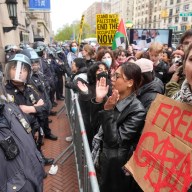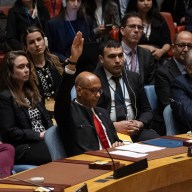SYDNEY, N.S. – Distressed relatives of a young Canadian soldier who shot his friend in a tent they shared in Afghanistan burst into tears and anguished cries on Thursday as a military jury declared him guilty of two charges, including criminal negligence causing death.
Cpl. Matthew Wilcox was also found guilty of negligent performance of duty, while a manslaughter charge was stayed in the March 6, 2007, death of his friend, 25-year-old Kevin Megeney of Stellarton, N.S.
After a nine-week trial in an often stifling military courtroom at the Victoria Park Garrison in Sydney, the jury of four officers took three hours to return with a verdict. The maximum penalty for a conviction of criminal negligence causing death is life in prison, the same as it is for manslaughter.
Wilcox’s mother and father grasped one another and cried quietly and other relatives put their heads in their hands as the verdict was delivered. One relative sitting in the second row of the public gallery gasped and cried out as the first conviction was read.
After a few minutes, Karen and Dexter Megeney – the parents of the dead soldier – left the courtroom through side entrances. A military spokesperson said they will wait until sentencing in September to comment publicly.
Outside the court, prosecutors said they regard the decision as just.
“This is a tragic story, this is an incident where a friend got shot and our theory was that it was an accident. Certainly there are other incidences where there is a higher level of intent,” said Maj. Jason Samson, one of the military prosecutors.
He had argued during the court martial that Wilcox was playing quick draw with his pistol – a game where both soldiers see who can pull their Browning 9-mm out of their holsters the quickest. Prosecution witnesses testified that Wilcox had told them that’s what happened.
Lt.-Cmdr. Rob Fetterley, the other prosecutor in the case, said he expects the case will help cut down on the number of cases of firearm mishandling in the military.
“Unfortunate examples like these are held up to fellow soldiers as reason not to treat your handgun in a manner other than with respect,” he said.
Wilcox declined comment on his way out of the courtroom, and showed no visible emotion during the reading of the verdict.
Defence lawyer Lt.-Col. Troy Sweet said his client’s greatest concern is for the emotional welfare of his family.
“He’s dealing with it,” he said. “He’s served in Afghanistan. His concern is for his own family, and his concern is for the Megeney family, actually.”
In his instructions, the military judge, Cmdr. Peter Lamont, told the jurors they should use “common sense” in determining which theory to believe on what happened at the Kandahar Airfield in March 2007.
The defence argued that Wilcox, 24, of Glace Bay, N.S., was acting in self-defence, believing that Megeney had pointed his pistol at his back and readied it to fire.
Prosecutors accused Wilcox of lacking credibility, saying his evidence was “contrived” and contradictory.
The prosecutors also said the self-defence argument didn’t stand up because Wilcox admitted he didn’t look at Megeney before firing, and agreed under cross-examination that he had options such as fleeing from any danger he might have felt.
Samson said he will not ask for the maximum life sentence allowed under the Criminal Code. Sentencing arguments, including victim impact statements from the Megeney family, will be heard beginning on Sept. 9.
The defence and the prosecution say this is the first manslaughter charge to be considered by a military jury where one Canadian soldier was accused of killing another during the Afghanistan conflict.
There was one other similar case, but it never went to trial.
In October 2008, a military judge adjourned court martial proceedings against Master Cpl. Robbie Fraser, who had faced manslaughter charges after a gun allegedly discharged in a military vehicle outside Kandahar, killing Master Cpl. Jeffrey Walsh of Regina.
The defence successfully argued that a ballistics report cast reasonable doubt on whether Fraser fired the fatal shot.
The military panel had a similar standard of proof as a civilian jury, with the prosecution having to prove that Wilcox was guilty beyond a reasonable doubt.
The charges of manslaughter and criminal negligence leading to death are in the civilian Criminal Code, while the third offence of neglect of duty is in military law.
During his instructions to the jury, Lamont said jurors could find Wilcox guilty of either manslaughter or criminal negligence causing death.
Lamont told the panel they could also find Wilcox guilty of neglect of duty, either on its own, or in combination with one of the two more serious charges.
The jury was selected by the military’s Office of the Judge Advocate General, based in Ottawa, with the defence and the prosecutors allowed to argue for or against their selection in pre-trial arguments.
















